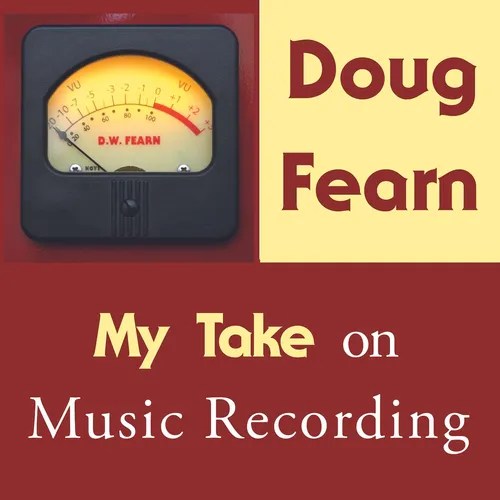
My Take on Music Recording with Doug Fearn
Doug Fearn draws on his 50+ years as a recording engineer, record producer, studio owner, and pro audio equipment designer to explain the art and science of recording for the audiophile, music lover, and people in the music recording industry.
- Update frequency
- every 19 days
- Average duration
- 38 minutes
- Episodes
- 108
- Years Active
- 2020 - 2025

Audiophiles Guide to Music Recording - Part 2
This is part 2 of the Audiophiles Guide to Music Recording. You can listen to part 1 at
https://www.buzzsprout.com/942952/14335456
Or you can access part 1 wherever you listen to podcasts…

Audiophiles Guide to Music Recording - Part 1
My Take on Music Recording is primarily aimed at people in the professional recording world, but there are a significant number of listeners who are music lovers and audiophiles. This e…

Reverb
Music is meant to be heard in an appropriate acoustical environment. But many times, we have to record in a space that does not have the right sound to it. Artificial reverb is often th…

Plug-ins vs Hardware
In this episode, I talk about software plug-ins vs hardware. It is a question that I get frequently from listeners. It is relatively short.
Can a plug-in perfectly emulate a hardware dev…

Improving Acoustic Spaces
Every recording is made is some sort of space. It might be a room, and studio, a church, a concert hall, or even outside.
The space where the music is performed, and where the microphone…

Twelve Rules for Better Recording
How do we make our recordings better? I have thought about this for over 50 years and in this episode, I have tried to distill what I learned into a dozen general rules.
The best way to …

Recording Unfamiliar Instruments
What if you were suddenly confronted with recording an instrument you had never had in the studio before? Or one you never heard before? Or one you never knew existed?
How do you figure …

In Case You Missed It...
After three and a half years of producing the “My Take on Music Recording” podcast, I thought it would be useful to review the 80+ episodes and point out some of the interesting topics …

Justin Gray on Immersive Audio Part 2
My conversation with musician, producer, mixer, and mastering engineer Justin Gray continues, in this second of two parts. In this episode, Justin discusses how to provide optimum track…

Justin Gray on Immersive Audio
Justin Gray is a musician, producer, mixer, and mastering engineer based in Toronto. His credits include many major artists.
He was fascinated by immersive formats long before they becam…

Music/Life Balance with Corrie Lynn Green
Most people have time conflicts between what they do for a living and the rest of their lives. That includes time for family and friends, hobbies, obligations, and exploring new directi…

Troubleshooting
Studios are complex technological environments and it is common for problems to arise. But a problem in the equipment might be a minor inconvenience if you have the skills to quicky det…

Dave Hill
Most of you in the professional audio world have learned that Dave Hill, founder of Crane Song, died in February.
Dave and I were friends for over 30 years. In this episode I tell some s…

Choosing the Right Microphone
How do you decide what microphone to use for any instrument or voice you will be recording? All microphones sound different from one another, which is a wonderful tool at our disposal. …

Headphones for Mixing
The typical music consumer these days is listening on earbuds or headphones. Or maybe on the tiny speakers in their smartphone. Few are listening on speakers, at least none of any reaso…

Terri Bright, SInger-songwriter and Behavioral Expert
Recording is a technological endeavor, but it also invariably involves people. The psychology of recording sessions has always fascinated me, so when a listener suggested that I have Te…

Why Different Gear Sounds Different
What makes one piece of studio electronic gear sound different from another, similar piece?
When it comes to the physical gear we need to record, there are only a few basic categories. Y…

Ribbon Microphones
If you have listened to this podcast for any length of time, you probably know that I am a big fan of ribbon microphones.
In this episode, I talk about my introduction to ribbon mics whi…

Doug Fearn Interviewed by Corrie Lynn Green
For this 70th podcast episode, things are reversed and I am interviewed by singer-songwriter Corrie Lynn Green. Corrie was curious about how I got into recording, and later into studio …

The Evolution of Contemporay Music with Chuck Anderson
You may remember Chuck Anderson from a 2-part episode we did in 2021, where Chuck and I had a wide-ranging discussion on many musical topics. You can listen to those discussions here:
h…